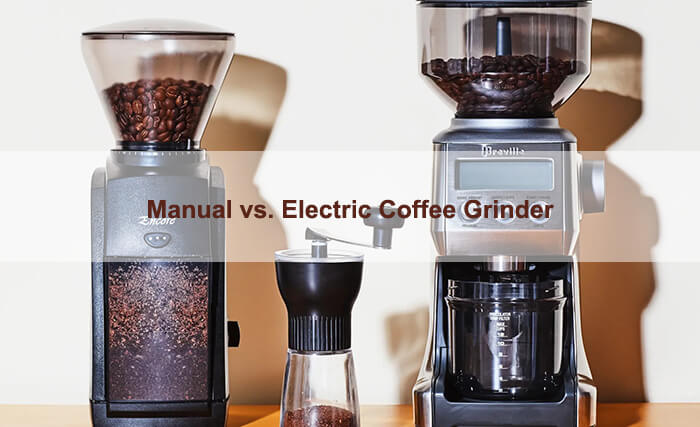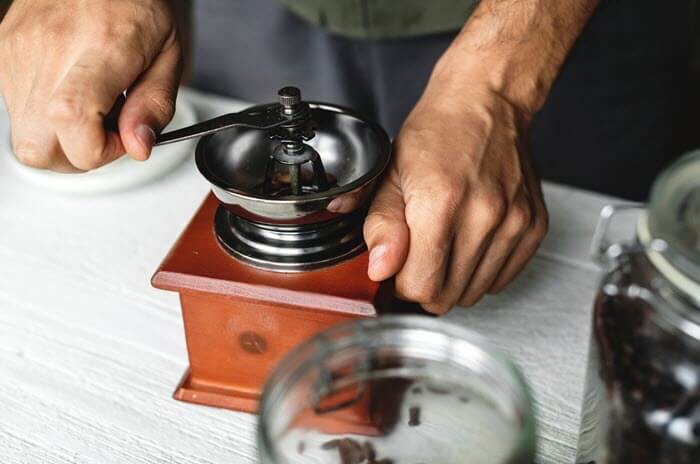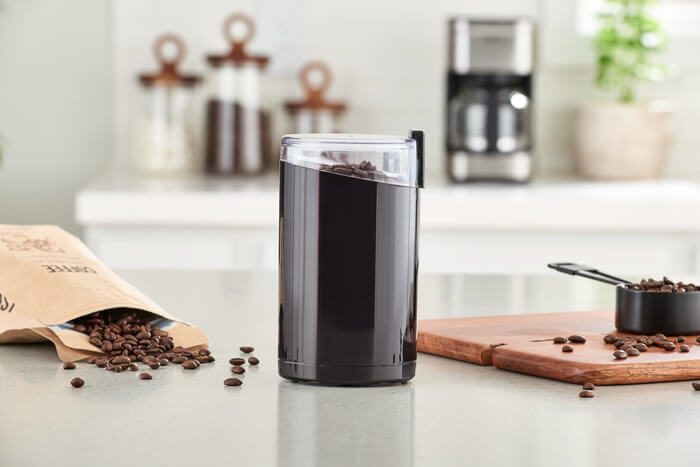Who doesn’t like the delicious scent of freshly brewed coffee in the morning? Or at noon? Or at all hours of the night?
Okay, some of us have a little coffee addiction. The trouble is that decent cafés aren’t open 24 hours a day – and we’ve been warned that chaining your favorite barista to the machine locked in your basement is “inhumane.”
So after you’ve chosen to buy your coffee machine, you’ll be puzzled about whether to choose a manual or electric coffee grinder.
When choosing between electric and manual coffee grinders, there are several factors to consider. Some elements that will influence your selection include convenience, simplicity of use, pricing, and accuracy.
This article will help you choose the right grinder for you.
Table Of Contents
Our Experience with Manual Coffee Grinder
As the name implies, a manual grinder uses manual human energy to do the task. You put the beans in, spin the crank, and are crushed. As a result, fresh ground coffee of the most excellent quality is produced in seconds.
Manual grinders may be set to create coarse or fine coffee grounds as needed, with finer grinds requiring more effort than coarser grounds.
The apparent advantage of a manual grinder is its ease of use. You don’t need batteries or a power source because the whole thing is portable and couldn’t be simpler to operate. Because of its simplicity is also less prone to malfunction than an electric grinder because of its simplicity.
Manual coffee grinders are less common than electric coffee grinders and are sometimes neglected by customers purchasing their first grinder. This is a mistake because manual coffee grinders are frequently more effective than electric grinders.
Manual coffee grinders, on the other hand, might be fantastic grinders! These machines are not as handy as electric grinders, but since they lack electronics and large mechanical elements like motors, they can be inexpensive.
Pros
- Mid-High Performance
- Portable
- Durable
- Simple
- Inexpensive
Cons
- Elbow-Grease
- Extra Elbow-Grease for Groups
- Limited Grind Size Settings
Who Is It For?
There’s something pleasant about manually crushing great coffee beans with a manual grinder. So if you like the process of manually creating fresh ground coffee, this one is for you.
Our Experience with Electric Coffee Grinder
Electric coffee grinders are typically the first grinders that most people consider when shopping for a decent grinder.
When compared to manual coffee grinders, electric coffee grinders are far more convenient, easier to operate, and substantially quicker at grinding beans.
The most appealing feature of an electric coffee grinder is that it eliminates all needed effort. Throw the beans into the grinder and hit a button with powered gadgets. The machine then performs the work for you, creating fresh ground coffee in seconds.
When designed and manufactured correctly, electric grinders can be workhorses that get the job done swiftly. Some electric choices can dosage crushed coffee by weight, removing the need for you to weigh your coffee beans (if you’re like that).
Electric coffee grinders are the best in terms of speed and convenience. They can also be surprisingly small and straightforward to operate. Prices range from magnificent to insane, as do the many grinding modes and settings.
Pros
- High Performance
- Convenient
- Durable
- Many Grind Size Settings
Cons
- Poorly Built
- Noisy
- Requires Electricity
- Can not achieve Espresso Grind Size
Who Is It For?
There are more than 40 settings available on certain high-end electric grinders on the market. If you value precise accuracy, an electric grinder can be exactly up your alley.
Which is Better, Manual Or Electric Coffee Grinder?
Consider your ideals and ambitions for a coffee grinder. Use these as a filter to choose which grinder type is best for you. I’ll assist you in breaking it down.
A manual coffee grinder can be right for you if,
- you want freshly ground coffee but don’t want to spend a lot of money on frills.
- you don’t mind a minute of physical labor and like the process of preparing coffee.
- you cherish the opportunity to bring fresh coffee with you everywhere you go without fear of your grinder breaking.
An electric coffee grinder could be for you if,
- you’re willing to invest more money in your coffee setup and love gadgets doing work for you
- you like good coffee and want to be able to obsess over little modifications.
- you don’t mind not being able to bring your grinder with you on your travels.
FAQs About Manual/Electric Coffee Grinder
Is a manual coffee grinder worth it?
Without a question, the most space-saving solution in the kitchen is a manual grinder. It is small enough to fit in your hand and might be squeezed into a tabletop corner. It’s also compact enough to put into a travel bag or backpack.
Aside from that, they virtually mimic the quality of coffee grind that many electric burr grinders provide at a fraction of the price.
Despite the physical exertion required to use one, the affordability of manual grinders appeals to many of us. Manual grinders are long-lasting and trustworthy, supplying you with freshly ground coffee for many years.
Are electric coffee grinders worth it?
Yes, electric coffee grinders are incredibly user-friendly.
They are easy to use and quick. Simply fill the hopper with coffee beans, choose your favorite grind size, and push the switch. You’ll have freshly ground coffee ready to brew in a matter of seconds.
More than 40 grind settings are available on high-end electric coffee grinders, ranging from French press to espresso.
Can manual grinders grind espresso?
To grind the espresso, you can use a basic hand-operated coffee grinder.
- The cornerstone of a superb espresso shot is freshly ground espresso beans.
- The grind size for espresso should be as fine as possible.
You may like: Espresso Vs. Coffee Beans: What’s the Difference?
How long do manual coffee grinders last?
A good manual coffee grinder should last at least 5 years and preferably 15 years. It also depends on how well you maintain it will determine this.
Like any other piece of coffee brewing equipment, your grinder will eventually show signs of wear and strain.
How long does it take to grind coffee manually?
Coffee beans should be ground in 6-9 seconds for coarsely ground coffee and 19-22 seconds for extremely finely ground coffee.
Depending on the brewing technique and the type of grinder you use, you may choose how long to process the beans.
Conclusion
Manual grinders, especially those equipped with flat metal burrs, can grind to practically any grind size. Cheaper manual grinders are significantly more efficient than inexpensive electric grinders.
Electric grinders are pricey, but they can grind as fine as you like, so choose carefully when deciding which electric grinder is ideal for your brewing style.
At the end of the day, both types of grinders are efficient for grinding coffee, but the type of grinder you choose should be determined by your budget and the sort of coffee brewing technique that you like.



